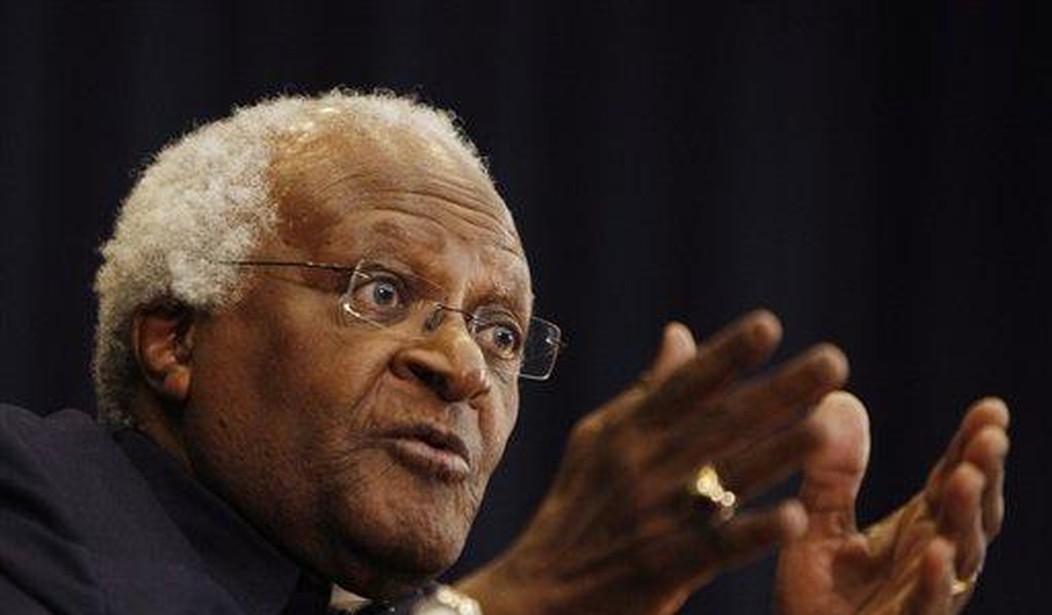Archbishop Desmond M. Tutu was a pivotal voice for the oppressed Blacks of his nation, calling out the crimes of apartheid, while urging for peaceful resolution of South Africa’s woes. Archbishop Tutu has died today in Cape Town, South Africa. He was 90 years old.
“Hope is being able to see that there is light despite all of the darkness”.- Archbishop Desmond Tutu pic.twitter.com/ONpOsJSU91
— Da Director™️ ⭕️ (@Mike_Yezi) December 26, 2021
The New York Times reports:
His death was confirmed by the office of South Africa’s president, Cyril Ramaphosa, who called the archbishop “a leader of principle and pragmatism who gave meaning to the biblical insight that faith without works is dead.”
The cause of death was cancer, the Desmond and Leah Tutu Legacy Foundation said, adding that Archbishop Tutu had died in a care facility. He was first diagnosed with prostate cancer in 1997, and was hospitalized several times in the years since, amid recurring fears that the disease had spread.
Much like the Rev. Dr. Martin Luther King, Jr. did during the Black American Civil Rights struggle, Archbishop Tutu used his religious platform as head of the South African Council of Churches (SACC) to engineer the downfall of apartheid. Archbishop Tutu preached that the policy of apartheid was a policy of dehumanization, not just for the oppressed, but for the oppressor. However, also like Dr. King, Archbishop Tutu decried the violent uprisings that marked much of the protests against apartheid. Instead, Archbishop Tutu called for economic sanctions against the South African government and peaceful protests in order to effect change.
As leader of the South African Council of Churches and later as Anglican archbishop of Cape Town, Archbishop Tutu led the church to the forefront of Black South Africans’ decades-long struggle for freedom. His voice was a powerful force for nonviolence in the anti-apartheid movement, earning him a Nobel Peace Prize in 1984.
When apartheid was overthrown, Archbishop Tutu once again led the way in reconciliation between white and Black South African citizens. Archbishop Tutu became the chairman of the Truth and Reconciliation Commission.
“You are overwhelmed by the extent of evil,” he said. But, he added, it was necessary to open the wound to cleanse it. In return for an honest accounting of past crimes, the committee offered amnesty, establishing what Archbishop Tutu called the principle of restorative — rather than retributive — justice.
His credibility was crucial to the commission’s efforts to get former members of the South African security forces and former guerrilla fighters to cooperate with the inquiry.
Even after the anti-apartheid movement succeeded, and after Nelson Mandela became the first Black South African president of the country, Archbishop Tutu continued to speak truth to power, calling out injustice, corruption, and poor leadership. The Archbishop was unfailingly consistent in pointing out wrongs where wrongs existed, and never separated his pastoral stance from his political leanings.
Desmond Mpilo Tutu was born on Oct. 7, 1931, to a domestic worker and a Methodist school teacher. As a young boy, Desmond was baptized a Methodist, but later the entire family became a part of the Anglican Church.
Tutu’s life was greatly influenced, and very well may have been saved, by the Rev. Trevor Huddleston, a white man who was also a prominent campaigner against apartheid. Tutu was hospitalized with tuberculosis and Rev. Huddleston visited him almost every day. Tutu recovered from this life-threatening bout of illness, and at first wanted to become a doctor. However, the family could not afford the tuition for such schooling. So, Tutu became a teacher instead, pursuing studies at the Pretoria Bantu Normal College before receiving a bachelor’s degree from the University of South Africa. Tutu taught high school for three years, but resigned in protest to the Bantu Education Act, which lowered education standards for Black students.
I took this photo in Cape Town when I hosted Cong John Lewis on his return to South Africa. He and Archbishop Tutu couldn’t wait to embrace one another. Brothers in struggle. Benders of the arc of justice. Joined in eternity. They’ve done the hard work and leave the rest to us pic.twitter.com/vgZ6zufZ3y
— Patrick Gaspard (@patrickgaspard) December 26, 2021
Tutu turned to the ministry in order to be of service. He studied at Johannesburg’s St. Peter’s Theological College, and in December 1961, he was ordained an Anglican priest at St. Mary’s Cathedral. Tutu served in local churches, went abroad to study at King’s College in London, England, lectured, administrated, and was consecrated as a bishop in 1976.
In 1978, Bishop Tutu became the first Black general secretary of the South African Council of Churches. It was here that the Bishop began to knit the wealth of his experience and leadership as an educator, lecturer, and spiritual leader, to establish the SACC as one of the organizations instrumental in opposing and felling apartheid in South Africa.
My dad is at rest. Thank you Tshezi for all you have been to our family and the world. Lala ngo xolo Desmond Mpilo Tutu.
— Naomi Tutu (@TutuNaomi) December 26, 2021
Archbishop Tutu has left an incredible legacy, as well as an incredible void.














Join the conversation as a VIP Member